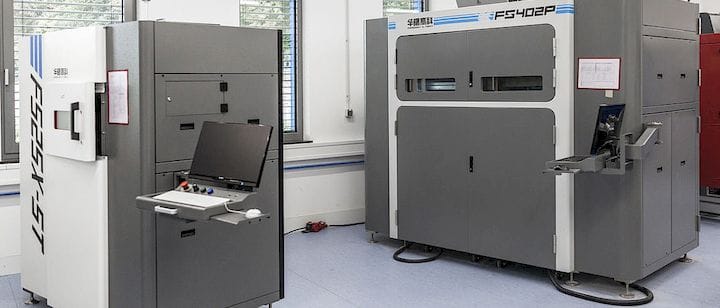![“PLS” 3D printers from LSS [Source: LSS]](https://fabbaloo.com/wp-content/uploads/2020/05/image-asset_img_5eb09e2a2a15f.jpg)
An interesting thought: is the term “SLS” wrong?
In an email conversation with PULVERMEISTER’s Luigi Monaco, he noticed something very interesting at the recent formnext trade show, where visitors were apparently confused by the up-to-now-thought-commonly-understood term, “SLS”. He says:
“Whilst exposing at the fair we learned that there is some confusion about the term SLS. Quite some people asked us if we would also do depowdering for metal. Metal is a completely different thing, so once cleared this was no problem. Still, we think that SLS should be named with a differentiation, with the name carrying the material group. LSS uses the term PLS.”
SLS, or “Selective Laser Sintering”, has been a term in the 3D printing industry for decades, having been the name assigned to a new process invented by Carl Deckard. This work was subsequently acquired by 3D Systems, where they continue to market a series of SLS machines to this day.
The common understanding of SLS is that it applies to polymers, as that was the original method that was named “SLS”. A laser slowly traverses a flat bed of (typically) nylon powder, fusing portions (hence the “Selective”). The process repeats, layer by layer, to build up an entire 3D object.
In all my experience in this space, SLS has always meant the selective fusing of polymers.
But the findings by Monaco above are quite intriguing. My suspicion is that the recent boom in metal 3D printing has attracted many new people to the 3D printing industry, and they’re unsurprisingly focused on metal 3D printing, not polymer 3D printing.
When someone unfamiliar with the terminology sees “SLS”, meaning “Selective Laser Sintering”, they could indeed become very confused. Why? Because most metal 3D printing processes, like DLMS, are in fact selectively sintering powder, in exactly the same way a polymer sintering system works. Literally just the powder is different (aside from a few other accommodations for the difficult-to-handle metal powder).
Monaco points us to 3D printer manufacturer LSS, who produce a line of powerful industrial 3D printers. They’ve chosen to not to use the “SLS” label, but instead use something called “PLS”. They explain:
“POLYMER LASER SINTERING (PLS)
Made of various thermoplastics such as polyamide (usually PA 6, PA 11 or PA 12 as natural types as well as composites), polypropylene (PP), thermoplastic elastomers (TPE), thermoplastic urethanes (TPU) and in the future also high-temperature polymers such as polyphenylene sulfide ( PPS) can be produced by layer build-up process fully loadable and ready-to-use functional parts of almost any geometry. By concentrating on functional expectations, this additive manufacturing process on our machines enables us to create technically sophisticated products that fully meet the individual requirements of our customers.”
Yes, that sounds a lot like SLS, doesn’t it?
I agree with Monaco and LSS: PLS, “Polymer Laser Sintering”, is far more descriptive and does not overlap with metal 3D printing in any way.
But could it really be an industry standard term? It depends on whether LSS has trademarked the term. If so, it is highly unlikely it could be adopted by others, as in that case it would be indirectly promoting LSS and competitors would not view that as a favorable advance.
Aside from LSS, the only mentions I see for PLS seem to be from various academic papers, who no doubt are seeking to use clear terms to describe their experiments. This is another hint that PLS would be a better term to use.
What do you think? Should we start using “PLS” instead of “SLS”? Could that ever be the de facto term for this process?











No one seems to offer collaborative 3D printing modes on dual extrusion devices. We explain why this is the case.